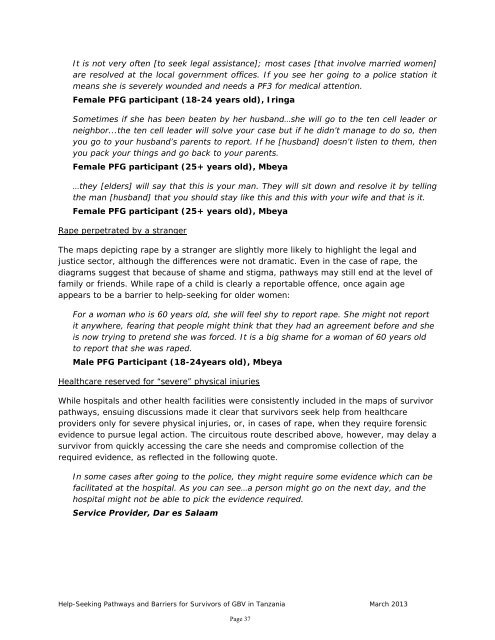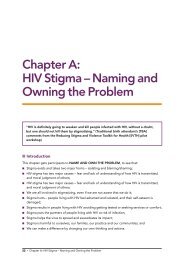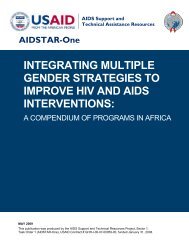Download PDF - ICRW
Download PDF - ICRW
Download PDF - ICRW
Create successful ePaper yourself
Turn your PDF publications into a flip-book with our unique Google optimized e-Paper software.
It is not very often [to seek legal assistance]; most cases [that involve married women]<br />
are resolved at the local government offices. If you see her going to a police station it<br />
means she is severely wounded and needs a PF3 for medical attention.<br />
Female PFG participant (18-24 years old), Iringa<br />
Sometimes if she has been beaten by her husband…she will go to the ten cell leader or<br />
neighbor...the ten cell leader will solve your case but if he didn’t manage to do so, then<br />
you go to your husband’s parents to report. If he [husband] doesn’t listen to them, then<br />
you pack your things and go back to your parents.<br />
Female PFG participant (25+ years old), Mbeya<br />
…they [elders] will say that this is your man. They will sit down and resolve it by telling<br />
the man [husband] that you should stay like this and this with your wife and that is it.<br />
Female PFG participant (25+ years old), Mbeya<br />
Rape perpetrated by a stranger<br />
The maps depicting rape by a stranger are slightly more likely to highlight the legal and<br />
justice sector, although the differences were not dramatic. Even in the case of rape, the<br />
diagrams suggest that because of shame and stigma, pathways may still end at the level of<br />
family or friends. While rape of a child is clearly a reportable offence, once again age<br />
appears to be a barrier to help-seeking for older women:<br />
For a woman who is 60 years old, she will feel shy to report rape. She might not report<br />
it anywhere, fearing that people might think that they had an agreement before and she<br />
is now trying to pretend she was forced. It is a big shame for a woman of 60 years old<br />
to report that she was raped.<br />
Male PFG Participant (18-24years old), Mbeya<br />
Healthcare reserved for “severe” physical injuries<br />
While hospitals and other health facilities were consistently included in the maps of survivor<br />
pathways, ensuing discussions made it clear that survivors seek help from healthcare<br />
providers only for severe physical injuries, or, in cases of rape, when they require forensic<br />
evidence to pursue legal action. The circuitous route described above, however, may delay a<br />
survivor from quickly accessing the care she needs and compromise collection of the<br />
required evidence, as reflected in the following quote.<br />
In some cases after going to the police, they might require some evidence which can be<br />
facilitated at the hospital. As you can see…a person might go on the next day, and the<br />
hospital might not be able to pick the evidence required.<br />
Service Provider, Dar es Salaam<br />
Help-Seeking Pathways and Barriers for Survivors of GBV in Tanzania March 2013<br />
Page 37

















